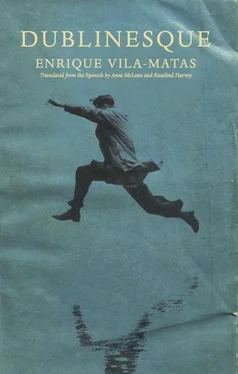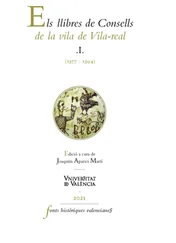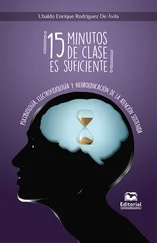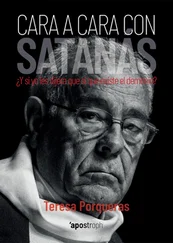Thinking of his talented young friend, twenty-seven years his junior, reminds him that, right now, Nietzky must be on his way to number 27 ½ Edison Street in Providence. Although Nietzky is in North America and he’s in Europe, at this moment they’re both in almost identical parallel situations, situations that are both preludes to the same trip to Ireland.
And he thinks that, when he first met Nietzky, no one could have predicted that one day they’d end up being friends. He can’t get the idea out of his head that their meeting fifteen years ago in Paris bore a certain resemblance — mainly in regard to Nietzky’s age difference and unpleasant farewell phrase — to the meeting that took place in Dublin between W. B. Yeats and James Joyce.
At that first meeting, after having reproached him for even the most impeccable side of his publishing policy, his future friend Nietzky said to him: “We might have been contemporaries, and perhaps even the best two members of our generation, I as a writer and you as a publisher. But that’s not how it turned out. You’re pretty old now, and it really shows.”
He didn’t bear a grudge, just as, the many differences aside, Yeats didn’t hold a grudge against the very young Joyce when they met in the smoking room of a restaurant on O’Connell Street in Dublin, and the future author of Ulysses , who’d just turned twenty, read the thirty-seven-year-old poet a collection of his own brief and eccentric prose descriptions and meditations, beautiful though immature. He had thrown over metrical form, young Joyce told him, that he might get a form so fluent it would respond to the motions of the spirit.
Yeats praised this endeavor, but the young Joyce said arrogantly: “I really don’t care whether you like what I am doing or not. Indeed I don’t know why I’m reading to you.” And then, putting his book down on the table, he proceeded to set out his objections to everything Yeats had done. Why had he concerned himself with politics, and above all, why had he concentrated on ideas and condescended to make generalizations? These things, he said, were all the sign of the cooling of the iron, of the fading out of inspiration. Yeats was puzzled, but then was confident again. He thought: “He’s from the Royal University, and thinks that everything’s been settled by Thomas Aquinas — no need to trouble about it. I have met so many like him. He would probably review my book in the newspaper if I sent it there.”
But his cheer disappeared when a minute later the young Joyce spoke badly of Wilde, who was a friend of Yeats’s.” Presently — although this was later refuted by Joyce who classified it as “café gossip,” claiming that, in any case, his parting words were never as disdainful as might be inferred from the anecdote — he got up to go, and as he was going out, said: “I am twenty. How old are you?” Yeats replied saying he was a year younger than he actually was. Joyce said with a sigh: “I thought as much. I have met you too late. You are too old. . ”
He talks to his parents, while imagining the parallel action that might be unfolding in Providence, near New York: Nietzky walking into the Finnegans Society at that very moment and greeting the Joyceans who welcome him as a new and unexpectedly Spanish member of their society, asking him if it’s true that he’s read Finnegans Wake in its entirety and also if it’s true that he’s a fan of this work. He can imagine Nietzky smiling and wildly launching into a recital of the whole book from memory: “Riverrun, past Eve and Adam’s, from swerve of shore to bend of bay. .” And he can also imagine the other members, overcome with horror, having to interrupt him.
“So what the hell happened in Lyon? We still don’t know anything about what happened there,” asks his mother suddenly.
“Oh, no! Please, Mama! Since very early this morning, until just before coming over here to see you two, I’ve been sitting at my computer reading all kinds of things about Dublin and studying the core” — brief pause, he swallows — “of all things Irish. And now. .”
He stops in his tracks, suddenly. He’s embarrassed to have said the core , because he thinks that the essence would have been a more suitable, more accurate term. But it doesn’t matter. Surely his parents can forgive him this sort of mistake. It’s all right. Or is it?
“The core? You’re so strange, son,” says his mother, who at times really does seem to be able to read his mind.
“The essence of all things Irish,” he grumpily corrects himself. “Right now, Mama, right now when I know I’m brimming with facts about Dublin and I wanted to tell you some things about this city, now that I even know what sort of trees I’ll find on the highway from the airport to my hotel in Dublin, you go and ask me about Lyon. What do you want me to tell you about Lyon? I said farewell to France there for a long time. I think that was all that happened. I said goodbye to France. I’ve studied it, tramped around it, looked at it for long enough.”
As long as he’s been tramping around and looking at this place, Riba was going to add, but held back.
“Tramped around France?” his father says.
Today more than ever a wake-like atmosphere can be sensed in this familiar living room. And although very early on in his adolescence he became aware of the strange stagnation of air and even the paralysis of everything alive that seemed to have taken possession of the room, never before has he had such a strong feeling of time being blocked, stopped, absolutely dead.
In this house, which seems more and more Irish to him, everything happens at a snail’s pace, and what’s more — perhaps so no entrenched custom can be altered in any way, nothing happens at all. It’s as if his parents were constantly holding a wake for their ancestors and precisely today, with maximum gravity, this ghostly family tradition falls heavily on the home. Indeed, he’d swear that more than ever, as so many times before, he’s seeing the ghosts of some of his ancestors. They are beings as blurry as they are out of place — they’re a little short-sighted — who act threateningly and resentfully toward the living. It’s important to acknowledge that at least they’re quite well mannered. And the proof is in the fact that, as if polite enough not to want to disturb things, some have discreetly left the wake, and are now standing over by the door, smoking and blowing the smoke out into the hallway. Riba wouldn’t be surprised if there were even a few of them playing soccer out on the patio right now. What good guys, he thinks suddenly. Today he’s taken to seeing them as if they were adorable ghosts. Indeed, they are. He’s been accustomed to them his whole life. They’re familiar to him in every sense. His childhood was swarming with these ghosts, laden with signs from the past.
“What are you looking at?” his mother says.
The spirits. This is what he should reply. Uncle Javier, Aunt Angelines, Grandpa Jacobo, little Rosa María, Uncle David. This is what he should say to her. But he doesn’t want trouble. He falls silent as a dead man, while thinking he’s hearing voices coming from the patio, maybe directly connected to that other patio, the one in New York. He amuses himself recalling in his mind wisps of the dead he’s seen before in other places. But he stays quiet, as if he himself were just another family apparition.
He tries to hear a conversation between the ghosts closest to him, the ones in the hallway — they seem easier to hear than the ones stirring up a fuss on the patio — and he thinks he hears something, but it’s so indistinct it’s not really anything at all, and then he remembers that famous description of the ghost to be found in Ulysses :
Читать дальше












